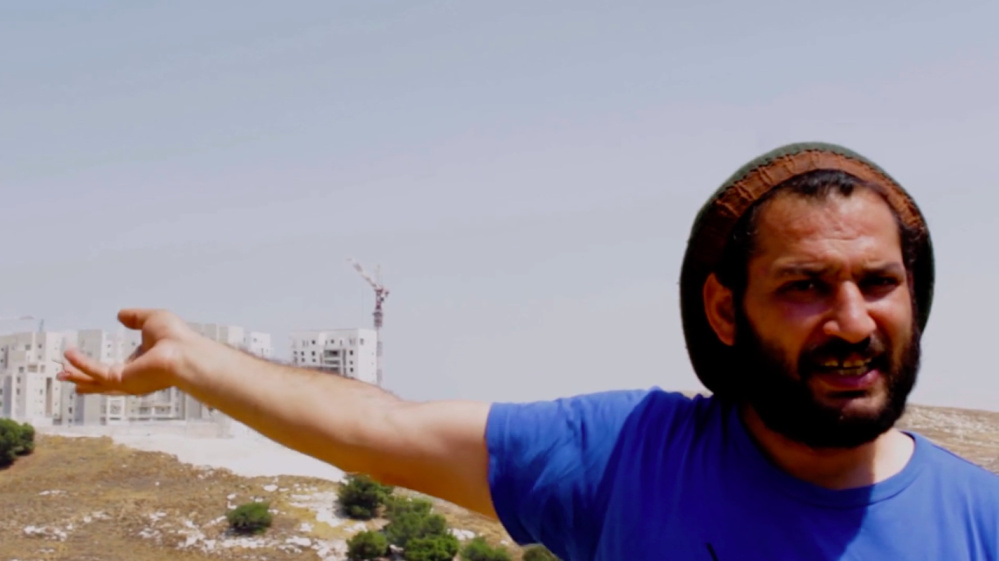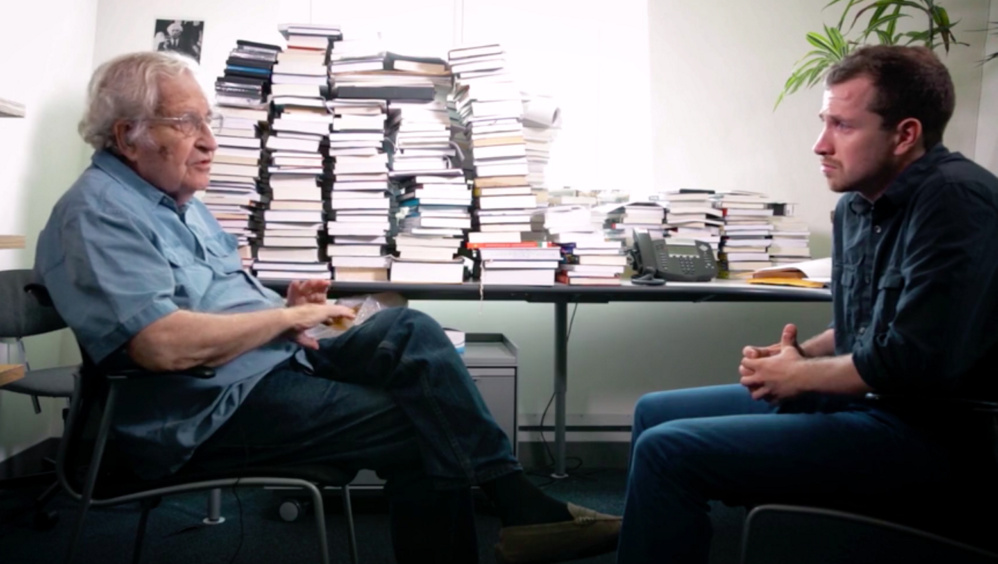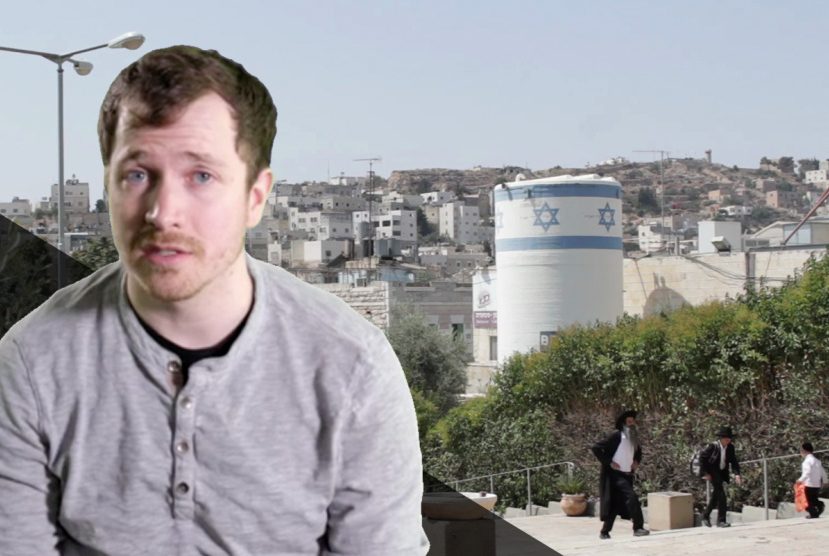Film director Eric Axelman said part of growing up Jewish in central Maine meant believing that the state of Israel represented Jewish hope, strength and perseverance. The founding of the Jewish state in 1948 following the Holocaust and the war in Europe, was redemption, he said.
But as he got older, Axelman, 27, of Norridgewock, said he discovered that Zionism — the Jewish nationalist movement whose goal has been the creation and support of a Jewish national state in Palestine, the ancient homeland of the Jews — took on a new, more frightening face.
He said the ancient homeland had come to embody colonialism, military occupation and institutionalized racism and that American Jews were not being told the whole story of what was happening to the Palestinian people.
In his film “70 Years Across the Sea: American Jews and 21st Century Zionism,” due for release in 2018, Axelman said he hopes to tell the story of a people who were united after World War II, but now see cultural and political differences emerging in Jewish communities in the United States and in Israel and what he calls “the internationally condemned settlements” in the region of occupied Palestine.
“The film is for general audiences, but I’m also really interested in having Jews re-examine what and how we’re being taught about Israel and trying to investigate what being Jewish means to us living in the 21st century and in a world that is changing so much,” Axelman said in a phone interview. “Not only, as American Jews, are we not being told the truth about Israel, but the most disturbing aspect is the censorship of left wing voices and voices that are critical of Israel in Jewish communities.”
Axelman’s father, David Axelman, a family doctor, is Jewish. Eric Axelman is a 2008 graduate of Skowhegan Area High School. His mother, also a medical doctor who is not Jewish, is Ann Dorney, a former state representative from Norridgewock.
Axelman said combined religious families and inter-marriage are being seen more often in the United States, as Jews assimilate into the general culture. He was raised Jewish, went to synagogue and Hebrew school.
After high school, Axelman attended Brown University in Providence, Rhode Island, before moving to Boston to form Pushed Learning and Media, a nonprofit, which helps start and maintain conversations about identity and inequality with school visits around the Northeast discussing racial equality and cultural appropriation using Hip Hop art as a media.
He said one of the great things about being Jewish is the shared intellectual history and tradition and the ability to question one another and to question the status quo. His film, he said, lives up to that history by bringing what he says is the truth about Zionism to the Jewish community. Gone, he said, is the passivity and victimhood of the Jewish people, and in its place are guns, walls and the aggression of occupied settlements.
As American Jews become more liberal and assimilated, Axelman says in the film’s trailer, Israel and it’s 50-year settlement of the West Bank, has become more nationalistic and more internationally isolated.
In the film’s trailer, Elias D’Eis, project manager at Holy Land Trust in Bethlehem, a Palestinian nonprofit organization seeking peaceful solutions, says American Jews are the main supporters of the Israeli state and have to say “Occupation is not my Judaism.” Americans have “the magic stick,” he says, they can change the Israeli government.
But supporters of Israel and the settlements say it is their land and they will fight to keep it.
Israel was forced into a war of survival when it “captured its historical highlands,” Oded Ravivi writes in an opinion piece for The Jerusalem Post in September. The land was legally ownerless at the time, he says. “No other nation on earth has more right to Judea than the people of Judah, aka the Jews,” Ravivi writes.
Axelman agrees to a point, noting that Jews didn’t have much of a choice but to move to Palestine, having faced “unbelievable oppression” in Europe and America wasn’t taking Jewish refugees after the war. The Jews are a Middle Eastern people originally, he said, but it’s the militarized aggression of the occupation forces that scare him.
Axelman said the film will be distributed at film festivals, college campuses and in synagogues. The debut of the trailer was Sunday at the Fortnight wine bar on Dorrance Street in Providence, Rhode Island.
The story in “70 Years” is told through the eyes and voices of Jews and Palestinians both in Israel and in the United States, including historian Noam Chomsky and Baha Hilo, a Palestinian activist. There are interviews with Israeli settlers, writers, and with a member of Seeds of Peace, an international organization that seeks peaceful communication among youth of all faiths worldwide. It is headquartered in New York with a summer camp in Otisfield, Maine.
There is also a member of Hillel, the Foundation for Jewish Campus Life, who says she was shocked to learn that the American Jewish community was actively trying to keep young American Jews ignorant of what is happening in Israel.
Axelman said the run time of the film is about one hour and 20 minutes, once it’s all finished.
“We’re almost finished production right now,” he said. “We’re releasing the trailer publicly next week and also releasing five small clips that touch on the major topics of the film.”
Axelman said the message of the film is that there is an increasingly widening of the gap between the world’s two biggest Jewish communities — United States and Israel. Previous generations of Jews were united politically and were loyal to the Israeli nation state, Axelman said.
Now, he said, the modern Jewish experience supports the only apartheid state in the world with the occupation of the West Bank. Axelman said he wants to show film-goers the truth of the occupation, but said he doesn’t have a lot of hope that anything is going to change any time soon as Israeli nationalism swells.
“There’s very little motivation in Israel to end the occupation,” Axelman said. “The Israeli government has no interest in ending occupation. I spoke with a lot of Israeli settlers, too, and they are not leaving; they’re not going to leave and the Israeli government will never make them leave unless things radically change in Israel.
“I have very little hope. Unless the international community really steps it up, like they did in South Africa, I think the occupation will last forever. The apartheid state will last indefinitely.”
When asked about the violence being carried out against Israelis by Palestinian groups such as Hamas, Axelman said he does not condone the violence.
“But, when a population is being colonized, and their land has been under illegal military occupation for half a century, you cannot expect people to remain peaceful, especially when decades of peaceful protest have not stopped the occupation.”
Doug Harlow — 612-2367
Twitter:@Doug_Harlow
Send questions/comments to the editors.






